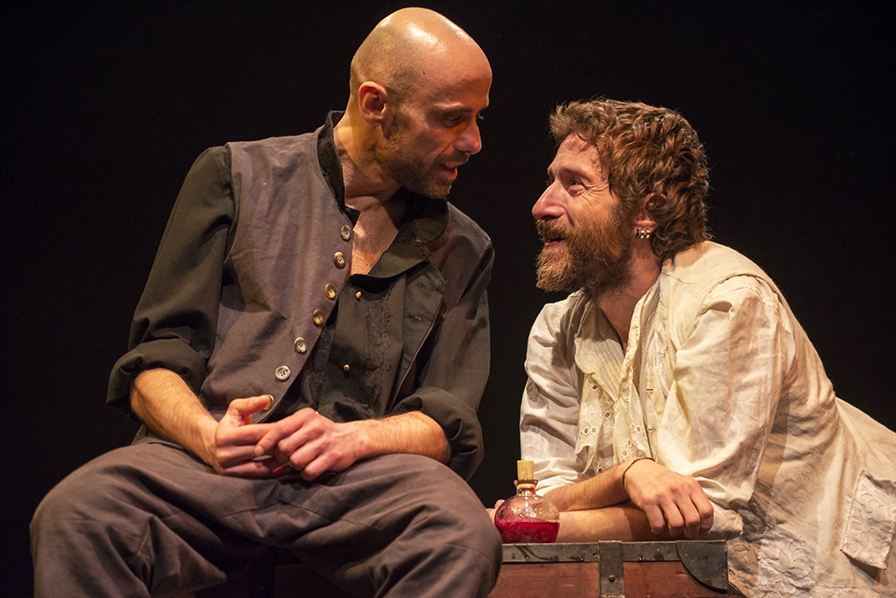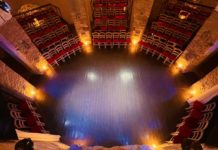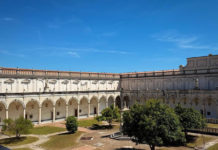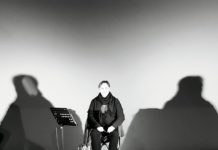Raimondo di Sangro, protagonista. Sabato 25 febbraio 2023 alle 21 (in replica domenica 26), sul palcoscenico del Pozzo e il Pendolo di Napoli nello spettacolo L’ultima notte del Principe di Sansevero, con Marco Palumbo e Andrea De Rosa (foto), nell’ideazione e la messa in scena di Annamaria Russo.
Il principe morì il 22 marzo 1771, di morte naturale, chino sul suo tavolo da lavoro, ingombro, fra alambicchi, ampolle e un calice.Alle sue spalle, un’ombra, il profilo di Giuseppe Sanmartino, l’uomo che scolpì il Cristo Velato. E’ la notte delle rivelazioni, dei segreti.
La leggenda della morte e della risurrezione è citata in diverse versioni dai maggiori scrittori dell’Ottocento. Una delle versioni vuole che il Principe affascinato dall’alchimia, si fosse convinto di aver trovato il modo di diventare immortale grazie ad alcuni elisir dalla ricetta segreta.
Il Principe di Sansevero e Giuseppe Sanmartino si conobbero a una festa di corte, alla fine del 1752. Quando il Principe lo incontrò per la prima volta, lo scultore era pressoché sconosciuto.
Secondo quanto riporta uno dei suoi maggiori biografi, Elio Catello, Sanmartino, fino a quel momento, aveva realizzato una sola commessa per la città di Monopoli. L’incontro con Raimondo de Sangro segna dunque una svolta nella vita del giovane che lo consegnerà al futuro: nel 1753 Sammartino aveva solo trentatré anni.
Non si è mai saputo perché il Principe avesse deciso di affidare il Cristo Velato a un artista così sconosciuto. Al progetto dell’opera, aveva lavorato Antonio Corradini e tutta la scuola di scultori che ruotava intorno alla cappella e al Principe. Con un colpo a sorpresa, però, don Raimondo decise di affidare il lavoro proprio a Sanmartino.
Lo spettacolo si concentra sull’ipotesi di un ultimo incontro segreto tra i due uomini, uniti dal filo dell’arte: una resa dei conti tra due personalità enormi in cui sono in gioco la morte o l’immortalità.
Teatro Il Pozzo e il Pendolo/ The last night of the Prince of Sansevero: that secret between Raimondo di Sangro and sculptor Giuseppe Sanmartino
Raimondo di Sangro on the Pozzo e il Pendolo’s stage. Saturday, Feb. 25, 2023 at 9 p.m. (repeated Sunday, Feb. 26), in the show The last night of the Prince of Sansevero, with Marco Palumbo and Andrea De Rosa (photo), in the conception and staging of Annamaria Russo.
The prince died on March 22, 1771, of a natural death, hunched over his cluttered work table among stills, cruets and a chalice. Behind him, a shadow, the profile of Giuseppe Sanmartino, the man who sculpted the Veiled Christ. It is the night of revelations, of secrets.
The legend of the death and resurrection is mentioned in different versions by the major writers of the 19th century. One of these versions says that the Prince, fascinated by alchemy, was convinced that he had found a way to become immortal thanks to some elixirs with a secret recipe.
The Prince died on March 22, 1771, of a natural death, hunched over his cluttered work table among stills, cruets and a chalice. Behind him, a shadow, the profile of Giuseppe Sanmartino, the man who sculpted the Veiled Christ. It is the night of revelations, of secrets.
The legend of the death and resurrection is mentioned in different versions by the major writers of the 19th century. One of these versions says that the Prince, fascinated by alchemy, was convinced that he had found a way to become immortal thanks to some elixirs with a secret recipe.
It was never known why the Prince had decided to entrust the Veiled Christ to such an unknown artist. On the design of the work, Antonio Corradini and the whole school of sculptors that revolved around the chapel and the Prince had worked. In a surprise stroke, however, Don Raimondo decided to entrust the work to Sanmartino himself.
The play focuses on the hypothesis of a last secret meeting between the two men, united by the thread of art: a showdown between two enormous personalities in which death or immortality are at stake










